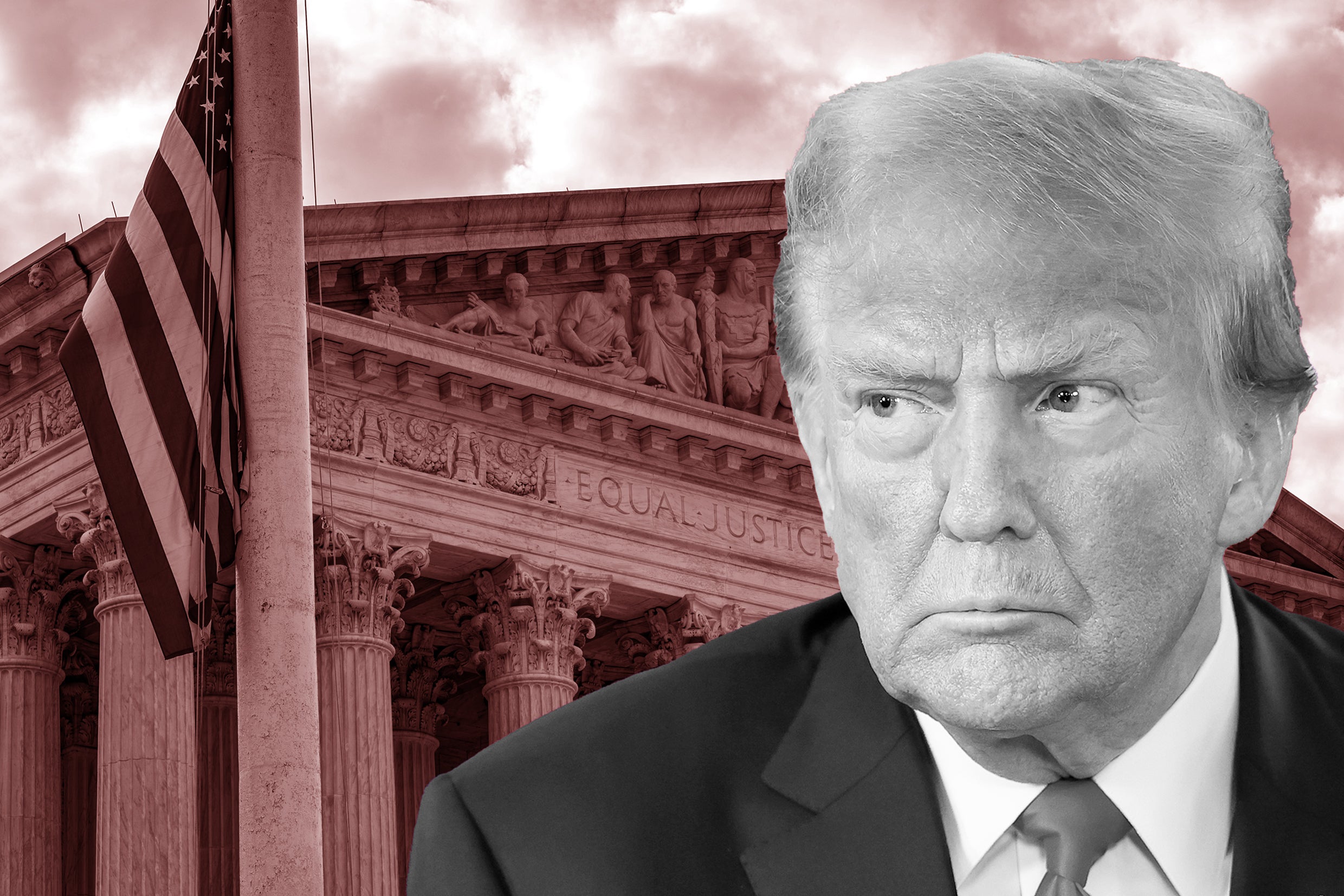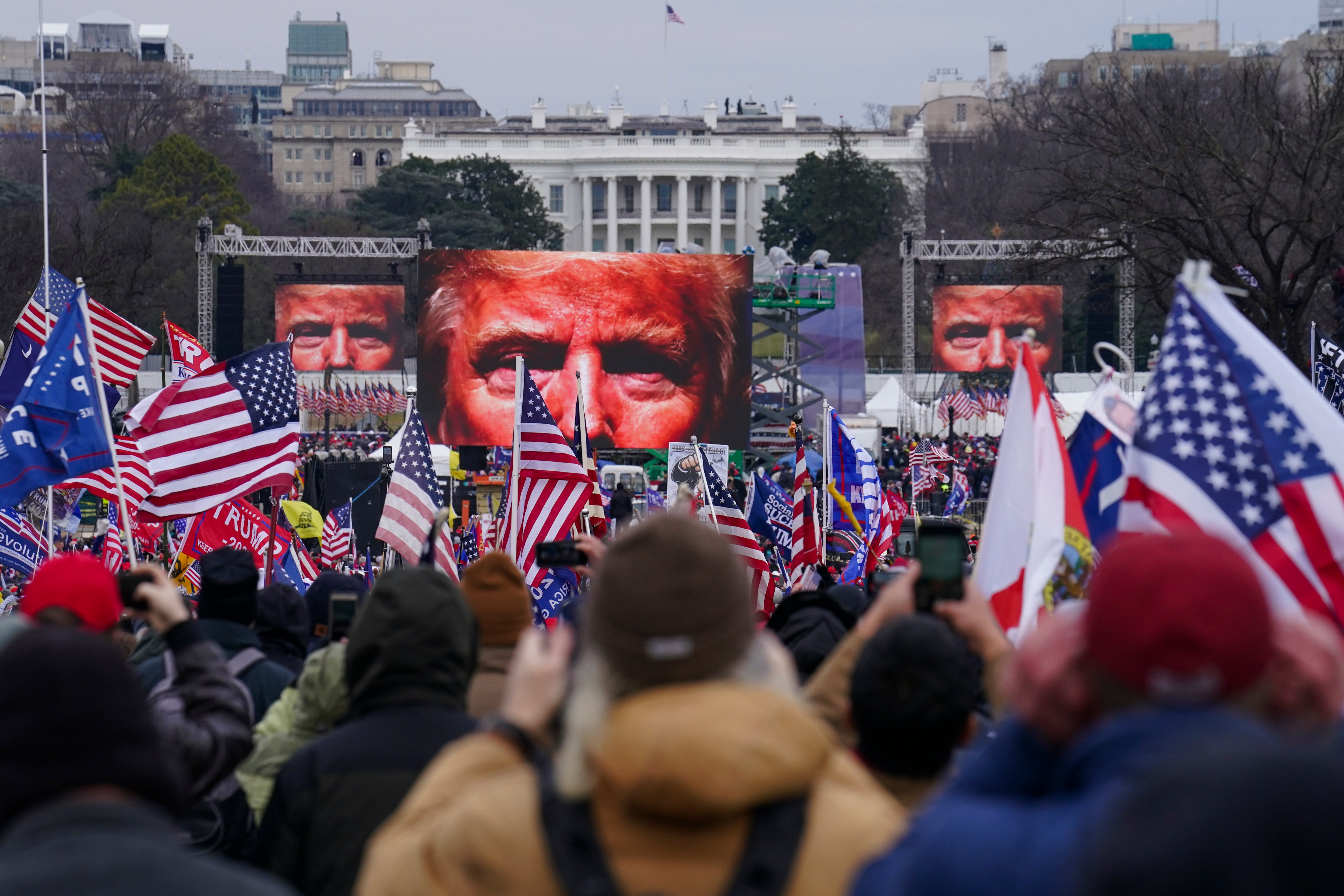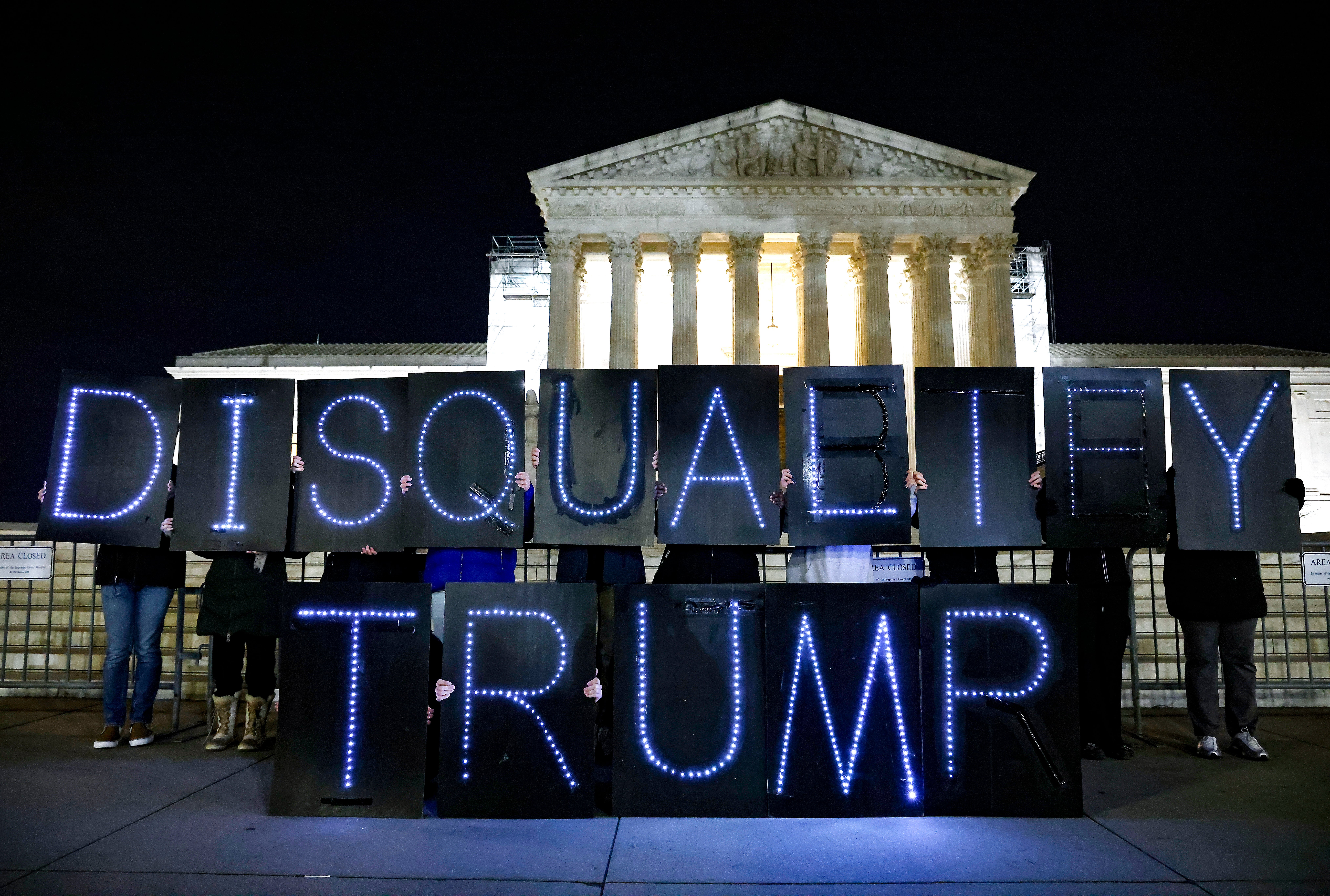Will the Supreme Court keep Donald Trump on 2024 ballots? Here’s what to expect
Justices could decide whether the former president is disqualified from office for his actions surrounding the January 6 Capitol riot. Alex Woodward explains


Your support helps us to tell the story
From reproductive rights to climate change to Big Tech, The Independent is on the ground when the story is developing. Whether it's investigating the financials of Elon Musk's pro-Trump PAC or producing our latest documentary, 'The A Word', which shines a light on the American women fighting for reproductive rights, we know how important it is to parse out the facts from the messaging.
At such a critical moment in US history, we need reporters on the ground. Your donation allows us to keep sending journalists to speak to both sides of the story.
The Independent is trusted by Americans across the entire political spectrum. And unlike many other quality news outlets, we choose not to lock Americans out of our reporting and analysis with paywalls. We believe quality journalism should be available to everyone, paid for by those who can afford it.
Your support makes all the difference.Did Donald Trump “engage” in insurrection? And if he did, can he be kicked off the presidential ballot? Or should that decision be left up to Congress?
These are the major constitutional questions surrounding Mr Trump’s presidential campaign, including whether he is immune from prosecution for crimes connected to the January 6 attack and if his name can be removed from ballots because of them, that the US Supreme Court could soon settle.
On Thursday, the nation’s highest court will consider whether Colorado election officials can remove Mr Trump from the state’s ballots in 2024, after the state’s top court disqualified him from the presidency under the US Constitution’s “insurrection” clause.
The case underscores the outsized role that courtrooms and Mr Trump’s mountain of criminal and civil cases have played in his campaign for the White House – a campaign that baselessly casts the 91 criminal charges, fraud lawsuits and sexual abuse and defamation claims against him as evidence of a conspiracy to keep him away from the presidency.
An historic case in front of the high court’s conservative supermajority – where three justices of the justices were appointed by the former president – also arrives as the Supreme Court faces questions about its own legitimacy and ethics obligations, following a wave of reports revealing some of the justices’ ties to powerful donors and special interests, including potential interference in the 2020 election.
What does the 14th Amendment say?
The case hinges on the interpretation of Section 3 of the 14th Amendment, which reads that “no person” who swore an oath to uphold the Constitution can hold any office, “civil or military, under the United States,” if they “engaged in insurrection or rebellion against the same”.
Only Congress, according to the amendment, can reverse that disqualification by a two-thirds vote of both the US House of Representatives and the Senate. It does not define who decides whether someone has engaged in “insurrection” or “rebellion,” or how.
The amendment was among a suite of civil rights amendments enacted in the volatile aftermath of the US Civil War. It ensured equal protection under the law to all citizens, including formerly enslaved people, with a broadly written clause aimed at preventing Confederates from returning to a government they were in rebellion against.
Section 3 effectively enshrined what President Abraham Lincoln had declared before Congress after the first shots of the war were fired in 1861.
A question of whether the American experiment can survive against “an internal attempt to overthrow it” remained in dispute, according to Lincoln, and “it is now for them to demonstrate to the world that those who can fairly carry an election can also suppress a rebellion; that ballots are the rightful and peaceful successors of bullets, and that when ballots have fairly and constitutionally decided there can be no successful appeal back to bullets; that there can be no successful appeal except to ballots themselves at succeeding elections.”
“Such will be a great lesson of peace, teaching men that what they can not take by an election neither can they take it by a war; teaching all the folly of being the beginners of a war,” he said in his address.
In a brief to the Supreme Court, civil rights attorney Sherrilyn Ifill wrote that Section 3 “was enacted for such a time as this, and for such a figure as President Trump.”
“Perhaps we hoped we would never need to activate its use again, and certainly not against an officer as highly positioned as the President of the United States,” she added. “To abandon Section 3 now would destabilize the balance struck by the 14th Amendment’s framers – a balance between guaranteed rights and structural tools that would allow those rights to withstand resistance to the vision and scope of the amendment’s core promises.”
Why is the case at the Supreme Court?
A September lawsuit filed by Citizens for Responsibility and Ethics in Washington on behalf of a group of five Republican and independent voters in Colorado argued that Mr Trump failed Section 3’s test, rendering him “constitutionally ineligible to appear on any Colorado ballot as a candidate for federal or state office”.
The lawsuit was filed against Colorado’s Secretary of State, the state’s chief elections official.
Following a trial and arguments from both parties in state court last year, Colorado District Judge Sarah Wallace determined that Mr Trump not only “engaged” with insurrection, he also “acted with the specific intent to incite political violence and direct it at the Capitol with the purpose of disrupting the electoral certification”.
Her decision, however, did not knock him off the ballot, as plaintiffs appealed the ruling up to the state’s Supreme Court.
In December, the Colorado Supreme Court ruled on the case, with the justices writing in a 4-3 majority opinion that Mr Trump “did not merely incite the insurrection.”
“Even when the siege on the Capitol was fully underway, he continued to support it,” they continued. “These actions constituted overt, voluntary, and direct participation in the insurrection”.
Attorneys for the former president appealed that decision to the nation’s high court, which agreed to hear the case on 8 February.
There is only one question before the justices: “Did the Colorado Supreme Court err in ordering President Trump excluded from the 2024 presidential primary ballot?”
Did Trump ‘engage’ an insurrection?
It’s a question that has been looming throughout the hundreds of criminal cases against rioters, though it’s a charge that hasn’t been brought against any of them. The federal election subversion case against Mr Trump charges him with conspiracy and obstruction, for his multi-state scheme to overturn the results of the 2020 election, followed by his pressure campaign against officials and his then-Vice President Mike Pence, and his failure to stop a mob from rejecting the results by force.
Judges in Colorado and Maine’s secretary of state have all determined that the attack amounted to an insurrection, with then-President Trump at the centre of it.

The case is not without recent precedent. Last year, Couy Griffin, a county commissioner in New Mexico who was convicted for his role in the Capitol riot, was permanently removed from office under a similar Section 3 “insurrection” challenge – marking the first successful attempt to disqualify a public official from holding office in more than 100 years.
The district court ruling in Colorado said Mr Trump “acted with the specific intent to disrupt the Electoral College certification of President Biden’s electoral victory through unlawful means; specifically, by using unlawful force and violence”.
Mr Trump “cultivated a culture that embraced political violence” and “intended for the crowd to engage in violence when he sent them to the Capitol ‘to fight like hell,’” Judge Wallace wrote.
The Colorado Supreme Court agreed.
Those justices determined that the former president’s “direct and express efforts, over several months, exhorting his supporters to march to the Capitol to prevent what he falsely characterized as an alleged fraud on the people of this country, were indisputably overt and voluntary” acts that constitute insurrection.
“Trump’s actions in the wake of the November 2020 election are alarmingly similar to activities that have destroyed democracies in other countries,” according to a brief filed by a group of democracy and authoritarianism experts, among dozens of Supreme Court filings that have laid out the historical and legal arguments for disqualifying him.
Without the 14th Amendment’s disqualification clause, members of Congress at the time of its drafting warned that “flagrant rebellion, carried to the extreme of civil war” would become “a pastime,” according to Pulitzer Prize-winning historian including Jill Lepore, among others, in their brief to the Supreme Court.
“Insurrectionists could take over state legislatures, state houses, Congress, the cabinet, and even the White House,” they wrote. “Section Three was meant to prevent that possibility.”
What do Trump’s attorneys say?
Mr Trump’s lead lawyer in the case, Jonathan Mitchell, has argued that Section 3 does not apply to his client.
The office of the presidency is not the same as “an officer of the United States” as written under Section 3 of the 14th Amendment, his attorneys argued. And even if it was, Mr Trump did not “engage in insurrection” with actions that he argues were protected under the scope of his presidency and the First Amdendment.

“President Trump never told his supporters to enter the Capitol, and he did not lead, direct, or encourage any of the unlawful acts that occurred at the Capitol,” Mr Mitchell wrote to the court. “Giving a passionate political speech and telling supporters to metaphorically ‘fight like hell’ for their beliefs is not insurrection either.”
In any case, Section 3 should be “enforced only through the congressionally enacted methods of enforcement,” according to Mr Trump’s attorneys.
He can’t be removed from the ballot because “no court or litigant can declare that President Trump is ‘presently’ disqualified from holding office without assuming or predicting that Congress will refuse to lift” any of Section 3 clauses that might apply, they argued.
“But neither the Colorado Supreme Court nor this court can declare a candidate ineligible for the presidency now based on a prediction of what Congress may or may not do in the future,” they added.
How will the Supreme Court rule?
Supreme Court justices could leave the 14th Amendment question up to individual states to decide. In that case, the Colorado Supreme Court ruling would not impact ballot challenges in other states, but state courts could point to the ruling when making their own decisions.
Alternatively, the justices could determine that Section 3 does not apply to the office of the presidency, or deliver more narrow rulings that Mr Trump’s actions do not qualify as “insurrection” or that only Congress can make that decision – rulings that would be favourable to Mr Trumop.
But, if a majority of justices side with voters who filed the lawsuit and uphold the Colorado Supreme Court ruling, Mr Trump’s name would likely be removed from ballots across the country – triggering other legal challenges during the election year.
“At its core, the disqualification clause serves as a safeguard against individuals who have already shown that they will disregard their oaths and do violence to the Constitution and our democracy,” according to a brief to the Supreme Court from a group of former Republican members of Congress.
“To allow such individuals to avoid answering for their conduct until after they win an election would be disastrous for the country.”


Join our commenting forum
Join thought-provoking conversations, follow other Independent readers and see their replies
Comments